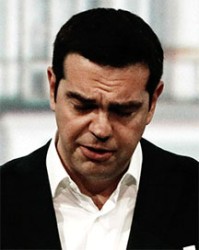ATHENS, (Reuters) – Greece moved to check the growing strains on its crippled financial system yesterday, closing its banks and imposing capital controls that brought the prospect of being forced out of the euro into plain sight.
After bailout talks between the leftwing government and foreign lenders broke down at the weekend, the European Central Bank froze vital funding support to Greece’s banks, leaving Athens with little choice but to shut down the system to keep the banks from collapsing.

Banks will be closed and the stock market shut all week, and there will be a daily 60 euro limit on cash withdrawals from cash machines, which will reopen tomorrow. Capital controls are likely to last for many months at least.
“The more calmly we deal with difficulties, the sooner we can overcome them and the milder their consequences will be,” a sombre-looking Prime Minister Alexis Tsipras said in a televised address. He promised bank deposits would be safe and salaries paid.
Even as Tsipras spoke late yesterday, lines forming at petrol stations and in front of the dwindling number of bank machines that still contained cash highlighted the scale of the disaster facing Greeks, who have endured more than six years of economic decline.
The failure to reach a deal with creditors leaves Greece set to default on 1.6 billion euros of loans from the International Monetary Fund that fall due tomorrow. Athens must also repay billions of euros to the European Central Bank in the coming months.
The impending default on the IMF loans leaves Greece sliding towards a euro exit with unforeseeable consequences for Europe’s grand project to bind its nations into an unbreakable union by means of a common currency. It also carries broad implications for the global financial system.
After months of wrangling, Greece’s exasperated European partners have put the blame for the crisis squarely on Tsipras’ shoulders. The 40-year-old premier caught them by surprise in the early hours of Saturday by rejecting the demands of lenders and calling a referendum on the bailout.
The creditors wanted Greece to cut pensions and raise taxes in ways that Tsipras has long argued would deepen one of the worst economic crises of modern times in a country where a quarter of the workforce is already unemployed.
After announcing the referendum, Tsipras asked for an extension of Greece’s existing bailout until after the July 5th vote. Euro zone officials refused, and in his televised address Tsipras bemoaned the refusal as an “unprecedented act”.
Despite the hardening of positions, officials around Europe and the United States made a frantic round of calls and organised meetings to try to salvage the situation.
U.S. President Barack Obama called German Chancellor Angela Merkel, and senior U.S. officials including Treasury Secretary Jack Lew, who spoke to Tsipras, urged Europe and the IMF to come up with a plan to hold the single currency together and keep Greece in the euro zone. The German and French governments announced emergency political meetings.
French Prime Minister Manuel Valls urged the Greeks to come back to the negotiating table.
“I cannot resign myself to Greece leaving the euro zone … We must find a solution,” Valls told Europe 1, Le Monde and iTELE in a joint interview.
SAFE HAVENS SOUGHT
The euro fell sharply against the dollar and safe-haven U.S. government debt futures rallied as investors exhibited fears of a Greek default and exit from the euro zone.
“That is going to have a real big impact on markets and that will generate increased volatility,” said Ian Stannard, European head of FX strategy at Morgan Stanley in London. The euro fell nearly 2 U.S. cents to a one-month low in early Asia Pacific trade. The fear of contagion produced a sharp move into safe-haven government debt. U.S. 10-year Treasury futures rose 1 27/32 in active trading early.
The bank holiday announced by Tsipras will last at least until Monday, July 6, the day after the planned referendum, an official said after a late-night meeting of the cabinet. The Athens stock exchange will be closed as the government tries to manage the financial fallout. It remains unclear how long capital controls will remain in force. In Cyprus, which imposed similar measures in 2013, they were not fully lifted until April this year.





